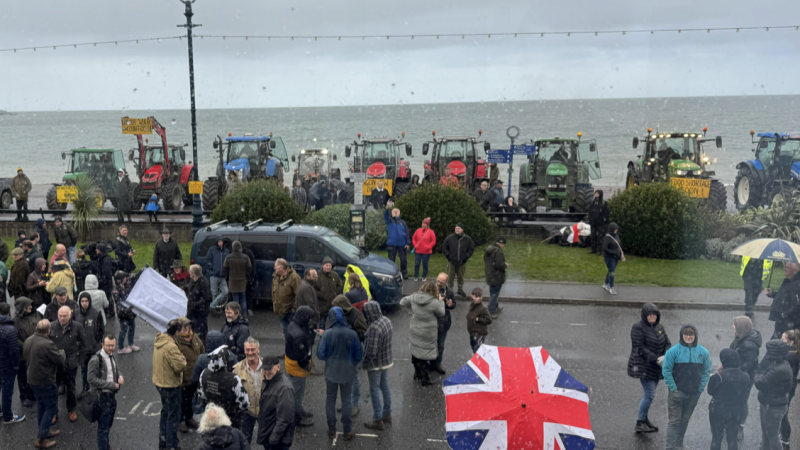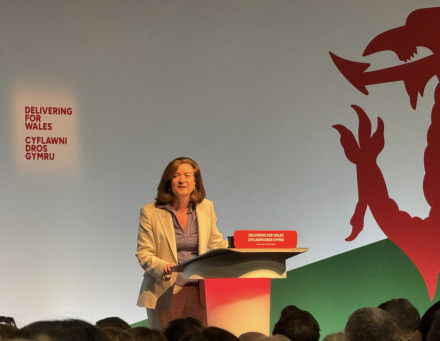
The Welsh Labour Party is worried about Reform; that was my main takeaway from a weekend in Llandudno with the Welsh party for its conference.
At a briefing event for activists on how to sell Labour policy on the doorstep, Constituency Labour Party delegates and councillors were given a fact sheet on how to counter unhappiness over the winter fuel payment decision (“The last UK government wrecked the economy, leaving a £22bn black hole in the public finances”; “There were no easy options, but not acting was not an option”).
All the attendees who spoke were finding significant anger about the decision, often from voters who fell just above the pension credit threshold.
All attendees were worried about Reform, who put in a strong performance at the general across the South Wales valleys. One member from Torfaen, where there are already 3 Reform councillors, expressed the concern that they could take further council seats.
 Out amongst the stalls, one charity employee focused on lobbying the Senedd was also pessimistic, predicting that Reform would at minimum take a substantial number of seats, and even be in with a smaller chance of wholesale control.
Out amongst the stalls, one charity employee focused on lobbying the Senedd was also pessimistic, predicting that Reform would at minimum take a substantial number of seats, and even be in with a smaller chance of wholesale control.
Reform’s viability at the next set of Senedd elections in 2026 is down to more than (supposedly) meeting the political moment; the number of representatives is expanding, from 60 to 96, and the voting system is changing, meaning a potentially easier road to Cardiff Bay.
SIGN UP: Get the best daily roundup and analysis of Labour news and comment in our newsletter
The threat of Reform was also addressed by the conference’s two headliners. Keir Starmer, speaking on Saturday morning, commented that “politics in our times is volatile and it can change very, very quickly”, in a nod to potential flips in the Senedd.
Eluned Morgan was more direct in her assertion that Nigel “Farage has no more interest in our country than he has for the people of Clacton”, before arguing that “Wales is not a one night stand. It’s a country”.
Change.
Two Labour governments, in Westminster and Wales, working in partnership to deliver for working people. pic.twitter.com/0KxAYXOSOy
— Keir Starmer (@Keir_Starmer) November 16, 2024
The biggest story of the conference (where motions debate was comradely to the point of inertia; I saw a smattering of hands go up to oppose a motion on nuclear power, but unanimous passing was largely the order of the day) took place outside the hall, on Saturday morning, when a convoy of tractors parked up to protest Labour’s plans on inheritance tax.
Starmer addressed opponents of the budget – whose honking horns could just about be heard in the hall as he spoke – fairly head-on, saying he would defend its policies “all day long”. Nonetheless, there was a feeling that the farmers outside were avatars of the broader threat bearing down on the Welsh party from right wing populism.

I spoke to one person, however, who thought the threat of Reform should perhaps not be the party’s foremost concern: one Senedd member was more worried about the votes the party could lose to the left, to the Greens and Plaid.
It’s undoubtedly a valid concern, and one common across the wider party since the general election this summer returned 4 Green MPs and 5 independents. It also gestures to the danger of over-deciding a narrative before it’s happened (that Reform will make big gains; that the ill feeling of the protesting farmers and those unhappy about winter fuel payments will flow naturally to Farage’s party).
The reasonably substantial pro-Palestine protest that took place outside the conference venue got far less attention than the farmers’, but it would be remiss not to note it or to treat those sentiments as business as usual or priced in. For the Welsh Party, as nationally, losing votes is not a zero sum game: you can shed support to both your left and your right.
Eluned Morgan is clearly well liked; people talk about her with genuine warmth, and her first speech to conference as First Minister (she walked out to “We Are Family” by Sister Sledge) was high energy and well received.
Having been an MEP and a Labour peer before coming to the Senedd in 2016, people seem happy to have an experienced hand on the till after an electorally successful (following July’s election there are no Tory MPs in Wales, full stop) but internally fraught (Vaughan Gething’s scandal-dogged 4 month leadership came to a close just after the general election) year for the Welsh party. Happy though people may generally be with Morgan, the common view is that the next few years will not be plain sailing.
A journalist’s job is, famously, not to report that people are saying it’s raining, but to look out the window and check. People at Welsh Labour were certainly saying they are worried about Reform. Given that, when looking out the window, the first thing one saw was tractors manned by irate farmers with signs saying “end Labour’s genocide on the countryside”, it seems like they might be onto something.
For more from LabourList, follow us on Threads, Bluesky, X, Facebook, Instagram or WhatsApp.
- SHARE: If you have anything to share that we should be looking into or publishing about this story – or any other topic involving Labour– contact us (strictly anonymously if you wish) at [email protected].
- SUBSCRIBE: Sign up to LabourList’s morning email here for the best briefing on everything Labour, every weekday morning.
- DONATE: If you value our work, please donate to become one of our supporters here and help sustain and expand our coverage.
- PARTNER: If you or your organisation might be interested in partnering with us on sponsored events or content, email [email protected].




More from LabourList
Nudification apps facilitate digital sexual assault – and they should be banned
Diane Abbott suspended from Labour after defending racism comments
Labour campaign groups join forces to call for reinstatement of MPs